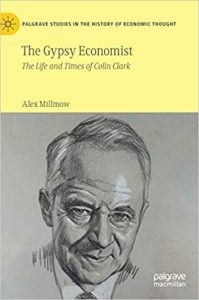Many people – including economists, I suspect – won’t recognise the name Colin Clark. Yet he has at least as much claim as Simon Kuznets to be known as one of the pioneers of national income accounting. I came across Clark’s work when researching my book on GDP, and was pleasantly surprised to know that he had been a Fellow (and much earlier a student) at my Oxford college, Brasenose. Eventually I put two and two together and realised that the very nice chap I had spoken to at various events was Colin Clark’s youngest son David, another Brasenose student.
Anyway, this is all by way of preamble to saying how much I’ve enjoyed reading Alex Millmow’s biography, The Gypsy Economist: The Life and Times of Colin Clark. This is the first biography of somebody who worked as a young man with Keynes, taught Richard Stone, and produced some of the first modern statistics on national income; and later corresponded with Kuznets and Lewis, creating the field of development economics alongside them. In 1984 the World Bank honoured him as one of the 10 pioneers of development economics, along with Hirschman, Myrdal, Rostow, Bauer and others. Clark was influential in the Labour Party, being particularly close to Hugh Dalton, before spending many years in Australia, as a government economist in Queensland. Later he returned to England for some years, where he was involved in the founding of the Institute for Economic Affairs.
It is natural to ask why, given his scholarly work, Clark is so unknown now. After all, Stone, Lewis and Kuznets all went on to win the Nobel. The answer probably lies in that career history, and political trajectory. Actually, Clark not only left academia for years to take up a policy role, he also seems to have torpedoed his chances in two other ways. One – emerging clearly from between the lines of the book – is that he was a maverick character, possibly even cantankerous. The other is that he converted to Catholicism and became an ardent advocate of ‘distributivism’, which seems to have been a romantic philosophy advocating small rural communities and the virtue of farming. The biography quotes throughout many comments to the effect that Clark was brilliant but his books and papers were disorganised – lacked an organising analytical framework – and were sloppy in many regards. One typical comment described him as, “Brilliant, original, provocative, eccentric and sometimes just plain wrong.”
Having said this, there are many fascinating aspects of Clark’s thinking that emerge here, including some themes that have re-emerged in economics more recently. One is an early and lasting interest in increasing returns to scale, stimulated by working with Allyn Young. The second is simply the opening up of development economics through the empirics of long-run trends: Clark, like Kuznets, did not focus on (what became) GDP but – in his case – on statistics including income distribution, leisure, macroeconomic stability, and natural resource use and depletion. His Catholicism made him interested in non-state, non-business economic institutions such as churches but also friendly societies and unions – an openness to the economic role of a variety of community institutions only just returning in today’s mainstream economics. It also meant he was pro-population growth (he & his wife had 9 children themselves), considering it essential for per capita growth as modern endogenous growth theories imply, and a fierce critic of the Ehrlich ‘population time bomb’ argument.
This very informative biography made me rather ashamed not to have known anything about Colin Clark until a few years ago, even when his papers were sitting in my college library. I learned a lot more from reading it. The book fills a gap in the history of economic thought, and about the history of policy economics in Australia. (Alas, it’s priced for libraries.)

